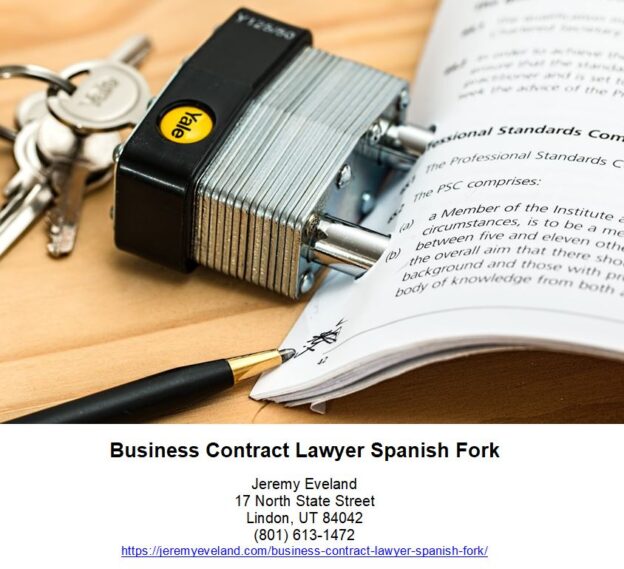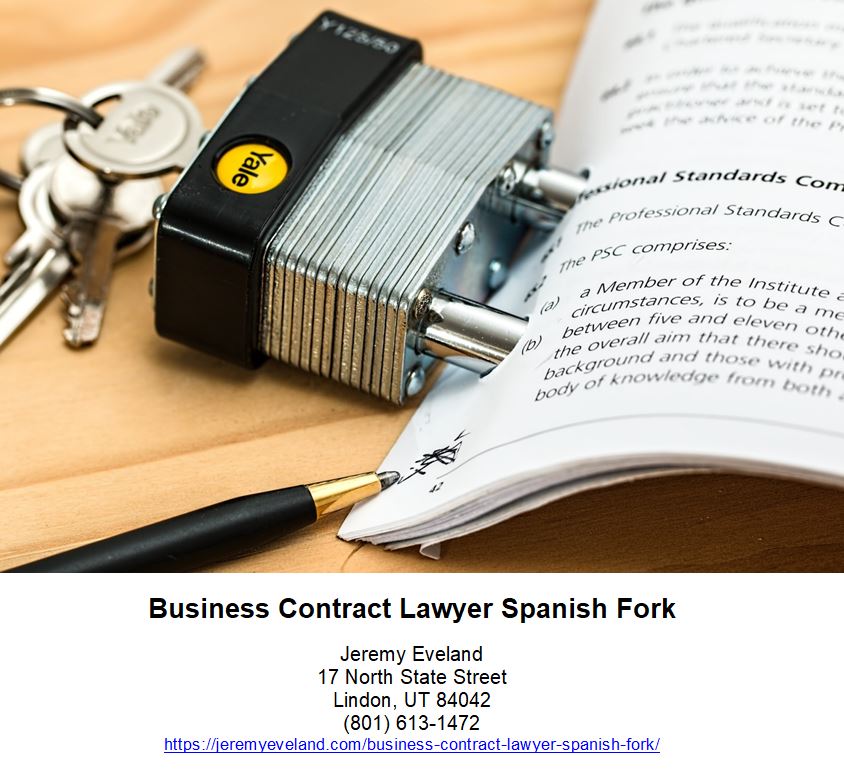-
Legal Topics
- Introduction
- How to Choose the Right Business Contract Lawyer in Spanish Fork
- The Benefits of Working with a Business Contract Lawyer in Spanish Fork
- Common Mistakes to Avoid When Drafting a Business Contract in Spanish Fork
- Understanding the Different Types of Business Contracts in Spanish Fork
- What to Look for in a Business Contract Lawyer in Spanish Fork
- Q&A
“Secure Your Business with a Professional Business Contract Lawyer in Spanish Fork!”
Introduction
Business Contract Lawyer Spanish Fork is a law firm that specializes in providing legal services to businesses in the Spanish Fork area. Our team of experienced attorneys is dedicated to helping businesses of all sizes navigate the complexities of contract law. We understand the importance of having a well-drafted contract that protects your interests and provides you with the best possible outcome. We are committed to providing our clients with the highest quality legal advice and representation. Whether you are a small business or a large corporation, our team of experienced attorneys can help you with all of your contract law needs.
How to Choose the Right Business Contract Lawyer in Spanish Fork
Choosing the right business contract lawyer in Spanish Fork is an important decision that can have a significant impact on the success of your business. A good business contract lawyer can help you navigate the complexities of business law and ensure that your contracts are legally sound. Here are some tips to help you choose the right business contract lawyer in Spanish Fork:
1. Research: Before you hire a business contract lawyer, it is important to do your research. Look for lawyers who specialize in business contract law and have experience in the Spanish Fork area. Check out their websites and read reviews from past clients to get an idea of their level of expertise.
2. Experience: Make sure the lawyer you choose has experience in the specific area of business contract law that you need help with. Ask them about their experience and make sure they have a good understanding of the laws in Spanish Fork.
3. Communication: It is important to find a lawyer who is easy to communicate with and who is willing to answer your questions. Make sure you feel comfortable talking to them and that they are willing to explain the legal process in detail.
4. Fees: Ask the lawyer about their fees and make sure you understand what services they are providing and how much they will charge. Make sure you are comfortable with the fee structure before signing any contracts.
By following these tips, you can ensure that you choose the right business contract lawyer in Spanish Fork for your needs. With the right lawyer, you can rest assured that your business contracts are legally sound and that you are protected.
The Benefits of Working with a Business Contract Lawyer in Spanish Fork
Working with a business contract lawyer in Spanish Fork can provide a number of benefits to businesses. A business contract lawyer can help to ensure that all contracts are legally binding and enforceable, and can provide advice on how to best protect the interests of the business. Additionally, a business contract lawyer can help to ensure that all contracts are drafted in accordance with applicable laws and regulations.
One of the primary benefits of working with a business contract lawyer in Spanish Fork is that they can provide advice on how to best protect the interests of the business. A business contract lawyer can review the terms of a contract and provide advice on how to best protect the business’s interests. This can include advice on how to structure the contract, how to negotiate the terms of the contract, and how to ensure that the contract is legally binding and enforceable.
Another benefit of working with a business contract lawyer in Spanish Fork is that they can help to ensure that all contracts are drafted in accordance with applicable laws and regulations. A business contract lawyer can review the terms of a contract and ensure that they are in compliance with applicable laws and regulations. This can help to protect the business from potential legal issues in the future.
Finally, a business contract lawyer in Spanish Fork can provide advice on how to best negotiate the terms of a contract. A business contract lawyer can provide advice on how to best structure the contract, how to negotiate the terms of the contract, and how to ensure that the contract is legally binding and enforceable. This can help to ensure that the business is able to get the best possible deal when negotiating a contract.
Overall, working with a business contract lawyer in Spanish Fork can provide a number of benefits to businesses. A business contract lawyer can help to ensure that all contracts are legally binding and enforceable, and can provide advice on how to best protect the interests of the business. Additionally, a business contract lawyer can help to ensure that all contracts are drafted in accordance with applicable laws and regulations. By working with a business contract lawyer in Spanish Fork, businesses can ensure that they are able to get the best possible deal when negotiating a contract.
Common Mistakes to Avoid When Drafting a Business Contract in Spanish Fork
1. Not Including All Necessary Information: When drafting a business contract, it is important to include all necessary information. This includes the names of the parties involved, the purpose of the contract, the terms and conditions, and any other relevant information. Failing to include all necessary information can lead to confusion and disputes down the line.
2. Not Having the Contract Reviewed by a Professional: Before signing a business contract, it is important to have it reviewed by a professional. A lawyer or other legal professional can help ensure that the contract is legally binding and that all parties understand their rights and obligations.
3. Not Being Specific Enough: Business contracts should be as specific as possible. Vague language can lead to confusion and disputes. It is important to clearly define the terms and conditions of the contract and to include any relevant details.
4. Not Including a Termination Clause: A termination clause should be included in any business contract. This clause outlines the conditions under which either party can terminate the contract. Without this clause, either party may be able to terminate the contract without any legal repercussions.
5. Not Including a Dispute Resolution Clause: A dispute resolution clause should be included in any business contract. This clause outlines the process for resolving any disputes that may arise between the parties. Without this clause, either party may be able to take legal action without any prior warning.
Understanding the Different Types of Business Contracts in Spanish Fork
Business contracts are an important part of any business transaction. They provide a legal framework for the parties involved to ensure that all parties understand their rights and obligations. In Spanish Fork, Utah, there are several different types of business contracts that can be used to protect the interests of all parties involved.
The first type of business contract is a purchase agreement. This type of contract is used when one party is purchasing goods or services from another party. It outlines the terms of the sale, including the price, payment terms, delivery terms, and any warranties or guarantees. It also outlines the responsibilities of each party in the event of a dispute.
The second type of business contract is a lease agreement. This type of contract is used when one party is leasing property from another party. It outlines the terms of the lease, including the length of the lease, the amount of rent, and any other terms and conditions. It also outlines the responsibilities of each party in the event of a dispute.
The third type of business contract is a service agreement. This type of contract is used when one party is providing services to another party. It outlines the terms of the services, including the scope of the services, the payment terms, and any other terms and conditions. It also outlines the responsibilities of each party in the event of a dispute.
The fourth type of business contract is an employment agreement. This type of contract is used when one party is hiring another party to work for them. It outlines the terms of the employment, including the job description, salary, benefits, and any other terms and conditions. It also outlines the responsibilities of each party in the event of a dispute.
These are just a few of the different types of business contracts that can be used in Spanish Fork, Utah. It is important to understand the different types of contracts and how they can be used to protect the interests of all parties involved. By understanding the different types of contracts, businesses can ensure that their interests are protected and that all parties understand their rights and obligations.
What to Look for in a Business Contract Lawyer in Spanish Fork
When looking for a business contract lawyer in Spanish Fork, it is important to consider a few key factors. First, it is important to find a lawyer who is experienced in business contract law. This means that the lawyer should have a thorough understanding of the laws and regulations that govern business contracts in the state of Utah. Additionally, the lawyer should have a proven track record of successfully negotiating and drafting business contracts.
Second, it is important to find a lawyer who is knowledgeable about the specific needs of your business. This means that the lawyer should be able to provide advice and guidance on the best way to structure a contract that meets the needs of your business. The lawyer should also be able to provide advice on how to protect your business interests in the contract.
Third, it is important to find a lawyer who is accessible and responsive. This means that the lawyer should be available to answer questions and provide advice in a timely manner. Additionally, the lawyer should be willing to work with you to ensure that the contract meets your needs and is in compliance with the law.
Finally, it is important to find a lawyer who is reliable and trustworthy. This means that the lawyer should be willing to provide honest and accurate advice and should be willing to stand behind their work. Additionally, the lawyer should be willing to provide references from past clients who can attest to their professionalism and expertise.
By taking the time to consider these factors, you can ensure that you find a business contract lawyer in Spanish Fork who is experienced, knowledgeable, accessible, reliable, and trustworthy.
Q&A
1. What is the role of a business contract lawyer in Spanish Fork?
A business contract lawyer in Spanish Fork is responsible for providing legal advice and assistance to businesses in the area. They help businesses draft, review, and negotiate contracts, as well as advise on legal issues related to business operations. They also provide guidance on compliance with applicable laws and regulations.
2. What types of contracts do business contract lawyers in Spanish Fork typically handle?
Business contract lawyers in Spanish Fork typically handle a variety of contracts, including employment contracts, vendor contracts, lease agreements, and purchase agreements. They may also provide advice on intellectual property matters, such as trademarks and copyrights.
3. What qualifications should I look for in a business contract lawyer in Spanish Fork?
When selecting a business contract lawyer in Spanish Fork, it is important to look for an attorney who is experienced in the area of business law and has a good understanding of the local laws and regulations. It is also important to find an attorney who is knowledgeable about the specific needs of your business.
4. How much does it cost to hire a business contract lawyer in Spanish Fork?
The cost of hiring a business contract lawyer in Spanish Fork will vary depending on the complexity of the matter and the attorney’s experience. Generally, attorneys charge an hourly rate for their services.
5. What should I do if I have a dispute with a business contract in Spanish Fork?
If you have a dispute with a business contract in Spanish Fork, it is important to seek legal advice from an experienced business contract lawyer. The lawyer can help you understand your rights and obligations under the contract and advise you on the best course of action.
Business Contract Lawyer Spanish Fork Consultation
When you need help from a Business Contract Lawyer near Spanish Fork UT call Jeremy D. Eveland, MBA, JD (801) 613-1472 for a consultation.
Jeremy Eveland
17 North State Street
Lindon UT 84042
(801) 613-1472
Related Posts
Concrete Pumping Business Lawyer
Do I Need A Board of Directors?
Estate Planning Lawyer West Valley City Utah
Business Contract Lawyer Spanish Fork
About Spanish Fork, Utah
Spanish Fork is a city in Utah County, Utah, United States. It is part of the Provo–Orem Metropolitan Statistical Area. The 2020 census reported a population of 42,602. Spanish Fork, Utah is the 20th largest city in Utah based on official 2017 estimates from the US Census Bureau.
Neighborhoods in Spanish Fork, Utah
Leland, Walmart Neighborhood Market, Spring Creek, North Park, Spanish Fork City Cemetery, Spanish Fork City Park, Spencer Curtis Memorial Park, Spanish Fork Dons Baseball Field, Canyon View Park - Spanish Fork, Spanish Fork Sports Park, Wash Tub, Sierra Park, Somerset Village, Parkside Estates Park, Utah County, Mayberry Street, The Ridge At Spanish Fork, Abbie Court Park, Quiet Valley by D.R. Horton, Spanish Fork Ranger District





